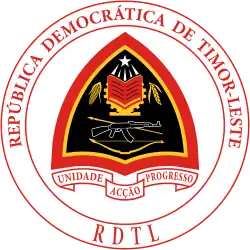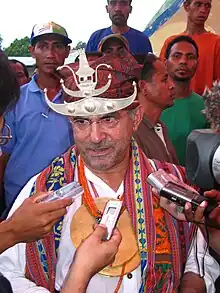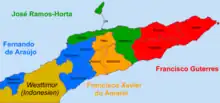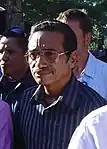| ||||||||||||||||
| ||||||||||||||||
| ||||||||||||||||
 |
|---|
| Constitution |
|
|
Presidential elections were held in East Timor in 2007. The first round on 9 April 2007 saw six of the eight candidates eliminated.[1] The remaining two candidates, incumbent Prime Minister José Ramos-Horta and FRETILIN President Francisco Guterres, faced each other in a runoff election on 9 May 2007.[2] Ramos-Horta won the second round with 69% of the vote.[3]
Candidates
Prime Minister José Ramos-Horta announced in February 2007 that he would be a presidential candidate, receiving the support of incumbent president Xanana Gusmão, who chose not to run for another term.[4] Ramos-Horta's main opponent among the seven other candidates was parliamentary speaker Francisco Guterres, though also running were Francisco Xavier do Amaral (also a candidate in the 2002 election), Avelino Coelho da Silva of the Socialist Party, Fernando de Araújo of the Democratic Party, Lúcia Lobato of the Social Democratic Party (the sole female candidate), João Viegas Carrascalão of the Timorese Democratic Union, and Manuel Tilman of the Association of Timorese Heroes.[5]
Campaign


Campaigning began on 23 March, the day after two people were killed in gun battles with police in the capital Dili, though Ramos-Horta did not mention this in his opening campaign speech, instead focusing on poverty.[6]
Following the announcement of the first round results, on 26 April Araújo announced his party's support for Ramos-Horta in the second round;[7] Ramos-Horta also received the support of four out of the five other candidates: Amaral, Lobato, Coelho da Silva, and Carrascalão. Manuel Tilman endorsed Guterres.[8]
Between the first and second rounds, Guterres alleged that Australian soldiers in East Timor as part of Operation Astute were interfering with the election process and Fretilin campaign rallies. The Fretilin party executive José Teixeira said:
The ISF (International Stabilisation Force) should not be frightening and intimidating an entirely peaceful election gathering... We are not convinced that there is no connection between the troops' behaviour and the Australian Government's apparent support for José Ramos-Horta.[9]
Both Ramos-Horta and the United Nations rejected the Fretilin's claims. On 8 May, the day before the second round, Ramos-Horta rebutted, saying:
Why are they so afraid, so upset that the international security forces go to the east? Because they wanted to operate, put pressure, threaten people with absolute impunity, without a neutral force standing by. That's why they're so upset.[10]
Prior to polling day, both candidates agreed they would accept the result no matter the outcome,[11] with outgoing President Xanana Gusmão also urging all sides to vote peacefully and accept the result.[12]
Conduct
The logistics of providing the entire East Timorese population with access to voting stations proved difficult through both elections. Across the country there were 700 polling stations. Some locations were so isolated that helicopters and donkeys were needed to distribute ballot papers to them.[13]
Amid tight security from the Australian forces present, the election was peaceful and orderly, with no violence related to the election reported.[14] However within a day of votes being counted, irregularities began to appear. These include 87 marked voting papers found at a booth before polls opened as well as children under 17 with their own registration cards attempting to vote.[15]
Results

Early results of the first round were announced by a spokesman for the national elections commission, Martinho Gusmão, who said that results from the capital Dili showed Ramos-Horta with about 30%, Araújo with about 25%, and Amaral and Guterres with about 20% each.[16] On 11 April, the president of the commission said that Guterres was in first place with 28.8% and would participate in a second round to be held in May, while Ramos-Horta had 22.5% and Araújo had 18.6%.[17] Five of the candidates — Araújo, Amaral, Lobato, Coelho, and Tilman — demanded that vote counting cease, alleging major problems in the election, and said that counting should only be conducted with all the candidates present to observe;[18] they said that they would legally challenge the outcome.[17] Soon afterward, Ramos-Horta joined the calls for a recount, and also called for a UN investigation regarding the absence of votes from 150,000 citizens.[19] Commission spokesman Martinho Gusmão subsequently said on 12 April that there would not be a recount,[20] but on 13 April he said that there were inconsistencies in the vote count and that it was possible that a re-vote might be necessary in some parts of the country.[21] According to final results released by the electoral commission on 18 April, Guterres had 27.89% of the vote (112,666 votes) and Ramos-Horta had 21.81% (88,102 votes), which meant that the two would face each other in a second round. Araújo followed in third place with 19.18% (77,459 votes). Voter turn-out was placed at 81.79%. Following the release of the results, candidates had 24 hours to appeal,[22] and three of the losing candidates, Araújo, Amaral, and Lobato did so,[23] but the results were confirmed by an appeals court.[24]
Following the second round, initial reports predicted a large majority for Ramos-Horta. Ramos-Horta said that he thought that he "could have 70-80%" of the vote, and a spokesman for the election commission said that he was in the lead in most districts.[25] With 90% of votes counted, Ramos-Horta had 73%. However, he declined to declare victory until the results were verified and final.[26] Subsequently, on 11 May, provisional results showed Ramos-Horta with 69% of the vote against 31% for Guterres, and Guterres accepted defeat and congratulated Ramos-Horta.[3] Voter turnout in the second round was placed at 81%.[27] Ramos-Horta took office on 20 May.[28]
| Candidate | Party | First round | Second round | |||
|---|---|---|---|---|---|---|
| Votes | % | Votes | % | |||
| Francisco Guterres | Fretilin | 112,666 | 27.89 | 127,342 | 30.82 | |
| José Ramos-Horta | Independent | 88,102 | 21.81 | 285,835 | 69.18 | |
| Fernando de Araújo | Democratic Party | 77,459 | 19.18 | |||
| Francisco Xavier do Amaral | Timorese Social Democratic Association | 58,125 | 14.39 | |||
| Lúcia Lobato | Social Democratic Party | 35,789 | 8.86 | |||
| Manuel Tilman | Association of Timorese Heroes | 16,534 | 4.09 | |||
| Avelino Coelho da Silva | Socialist Party of Timor | 8,338 | 2.06 | |||
| João Viegas Carrascalão | Timorese Democratic Union | 6,928 | 1.72 | |||
| Total | 403,941 | 100.00 | 413,177 | 100.00 | ||
| Valid votes | 403,941 | 94.56 | 413,177 | 97.34 | ||
| Invalid/blank votes | 23,257 | 5.44 | 11,298 | 2.66 | ||
| Total votes | 427,198 | 100.00 | 424,475 | 100.00 | ||
| Registered voters/turnout | 522,933 | 81.69 | 524,073 | 81.00 | ||
| Source: ANFREL, IFES | ||||||
First round results by district
| District | Guterres | Ramos-Horta | de Araújo | do Amaral | Lobato | Tilman | Coelho da Silva | Carrascalão |
|---|---|---|---|---|---|---|---|---|
| Aileu | 873 | 1,592 | 1,492 | 11,767 | 817 | 1,089 | 288 | 217 |
| Ainaro | 2,453 | 901 | 4,623 | 6,103 | 1,603 | 5,555 | 377 | 714 |
| Baucau | 30,956 | 13,265 | 1,105 | 865 | 1,226 | 604 | 823 | 300 |
| Bobonaro | 4,803 | 5,562 | 13,930 | 2,325 | 6,678 | 1,250 | 635 | 815 |
| Cova Lima | 6,240 | 1,867 | 7,681 | 3,192 | 3,242 | 676 | 218 | 384 |
| Dili | 11,801 | 29,619 | 9,904 | 12,672 | 4,662 | 1,734 | 1,322 | 771 |
| Ermera | 7,187 | 3,843 | 18,516 | 5,946 | 1,769 | 1,712 | 657 | 1,057 |
| Lautém | 12,392 | 6,006 | 3,248 | 743 | 2,884 | 345 | 519 | 323 |
| Liquiçá | 1,979 | 7,446 | 3,168 | 4,089 | 3,855 | 1,001 | 571 | 791 |
| Manatuto | 2,673 | 6,015 | 2,133 | 2,686 | 485 | 539 | 702 | 681 |
| Manufahi | 4,953 | 1,745 | 3,116 | 6,554 | 1,497 | 870 | 281 | 261 |
| Oecussi-Ambeno | 5,661 | 4,791 | 7,643 | 630 | 5,651 | 491 | 254 | 410 |
| Viqueque | 20,695 | 5,450 | 900 | 553 | 1,420 | 668 | 1,691 | 204 |
| Total | 112,666 | 88,102 | 77,459 | 58,125 | 35,789 | 16,534 | 8,338 | 6,928 |
Second round results by district
| District | Ramos-Horta | Guterres |
|---|---|---|
| Aileu | 16,591 | 1,075 |
| Ainaro | 16,395 | 5,121 |
| Baucau | 16,987 | 33,745 |
| Bobonaro | 30,351 | 5,504 |
| Cova Lima | 17,246 | 5,343 |
| Dili | 63,010 | 15,787 |
| Ermera | 33,923 | 7,198 |
| Lautém | 12,919 | 13,547 |
| Liquiçá | 20,705 | 2,881 |
| Manatuto | 13,571 | 3,240 |
| Manufahi | 14,362 | 4,857 |
| Oecussi-Ambeno | 19,332 | 6,879 |
| Viqueque | 10,443 | 22,165 |
| Total | 285,835 | 127,342 |
References
Notes
- ↑ "Two set to square off for presidency", AAP (news.com.au), 18 April 2007
- ↑ "East Timor set for presidential run-off", Sydney Morning Herald, 6 May 2007
- 1 2 "Guterres congratulates Horta as new president of Timor-Leste", Xinhua (People's Daily Online), 11 May 2007.
- ↑ "Nobel laureate Jose Ramos-Horta to run for president in East Timor", Associated Press (International Herald Tribune), 24 February 2007.
- ↑ "Timorese prepare to elect new president", Australian Associated Press (The Sydney Morning Herald), 10 March 2007.
- ↑ "East Timor election campaign starts against backdrop of violence", Associated Press (International Herald Tribune), 23 March 2007
- ↑ "Ramos Horta wins key support", AFP (The Age), 27 April 2007.
- ↑ Abdul Khalik, "Support for Ramos-Horta no guarantee of a win, say observers", The Jakarta Post, 9 May 2007.
- ↑ "Aust peacekeepers 'intimidating' E Timor voters", ABC News Online, 6 May 2007.
- ↑ "Ramos Horta denies Aust interference", ABC News Online, 8 May 2007.
- ↑ "Timor-Leste presidential runoff set", United Press International, 8 May 2007.
- ↑ "Gusmao urges peaceful outcome of poll", The Australian, 9 May 2007.
- ↑ "Confusion hits voter turnout in E Timor", ABC News Online, 9 May 2007.
- ↑ "E Timor holds peaceful landmark vote", Independent Online, 9 May 2007.
- ↑ "East Timor electoral count continues", Radio Australia, 10 May 2007
- ↑ Anthony Deutsch, "Nobel laureate could be president", Associated Press (AdelaideNow), 10 April 2007.
- 1 2 Stephen Fitzpatrick, "East Timor poll candidates threaten court action", The Australian, 11 April 2007.
- ↑ "Stop counting the votes, demand candidates", AFP (IOL), 11 April 2007.
- ↑ "UN urged to investigate Timor vote", AAP (The Age), 12 April 2007.
- ↑ Ahmad Pathoni, "East Timor poll body rejects call for recount", Reuters (IOL), 13 April 2007.
- ↑ "East Timor election 'seriously flawed'", AFP (The Australian), 13 April 2007.
- ↑ "Two set to square off for presidency", AAP (news.com.au), 18 April 2007.
- ↑ Anne Barker, "Unsuccessful candidates appeal against E Timor election results" Archived 29 May 2007 at the Wayback Machine, abc.net.au, 20 April 2007.
- ↑ "Court confirms East Timor election results" Archived 30 September 2007 at the Wayback Machine, AFP (Gulf Times), 22 April 2007.
- ↑ "Ramos-Horta ahead in E Timor poll", BBC News, 10 May 2007.
- ↑ "Ramos-Horta sweeps to victory in Timor poll", Sydney Morning Herald, 11 May 2007.
- ↑ National Election Commission (CNE) final results Archived 21 June 2007 at the Wayback Machine, 14 May 2007.
- ↑ "Horta sworn in as Timor-Leste's new president", Xinhua (People's Daily Online), 21 May 2007.
Further reading
- Silva, Kelly (2009). "Suffering, Dignity and Recognition. Sources of political legitimacy in independent East Timor". In Cabasset-Semedo, Christine; Durand, Frédéric (eds.). East-Timor: How to Build a New Nation in Southeast Asia in the 21st Century?. Bangkok, Thailand: Institut de recherche sur l’Asie du Sud-Est contemporaine. pp. 139–158. ISBN 9786119028203. Retrieved 30 November 2020.
External links
- (in Tetum and Portuguese) East Timor National Election Commission website
- East Timor Legal Information Site
_(cropped).jpg.webp)
